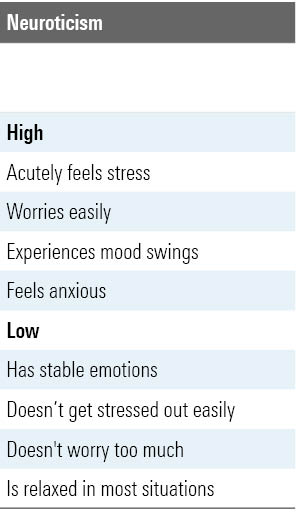How to Advise Neurotic Investors
Contributor Michael Pompian offers ideas for working with this personality.
This is the 10th article in a series focusing on the Big Five personality traits and how they relate to the behavioral biases of investors. Over the years, I have followed a debate between the effectiveness of the Myers-Briggs test versus another widely used personality test, the Big Five. More recently, the debate has intensified. I decided to conduct a study of the Big Five. I studied 121 investors, examining the relationship between the Big Five and investor biases. Why? Because taking the time to understand the underlying personality of the investor leads to better advice and results.
This month's article provides advice on dealing with investors high in neuroticism, the subject of last month’s article.
As a refresher, neuroticism is a trait characterized by sadness, moodiness, and emotional instability. Individuals who are high in this trait tend to experience mood swings, anxiety, irritability, and sadness. Those low in this trait tend to be more stable and emotionally resilient.

Working With Neurotic Investors Neurotic investors emphasize financial security and preserving wealth rather than taking risks to grow wealth. These investors are often deliberate in their decisions and sometimes have difficulty taking action with their investments, out of concern that they may make the wrong decision. They instead may prefer to avoid risk and stick to the status quo. Neurotics often obsess over short-term performance (in both up and down markets but mostly in down markets), and they also tend to worry about losing what they had previously gained.
Because the focus is on financial security, neurotic biases tend to be dominated by emotion--relating to how they feel--rather than focusing on cognitive aspects--relating to how they think. The behavior biases that can affect neurotic investors' ability to attain their financial goals are obsession with preserving assets and (sometimes) excessively conservative behaviors as exhibited in loss aversion and status quo.
Upside/Downside of Neurotic Investors There are certain benefits that accrue to neurotics. Focused on preserving capital and avoiding losses, neurotics often have portfolios exhibiting lower volatility, which can lead to better long-term compounded returns. Additionally, neurotics are less likely to engage in excessive trading activity, which has been shown to be detrimental to wealth accumulation. By taking a more deliberate approach to investing, neurotics are more likely to stick to a long-term plan.
The downside of the neurotic trait has to do with an excessive focus on avoiding losses. They may panic during market meltdowns and sell out after suffering losses, only to see markets rebound in the ensuing months. Neurotics may also sell their winning investments too quickly in an effort to protect gains, which can also inhibit long-term financial success. Neurotics sometimes fail to take enough risk to meet their goals--for example, by holding too much cash and bonds when their goals require the return potential that stocks can provide.
Additionally, their biases are mainly emotional, which are hard to change or moderate, especially during market upheavals. During such times, neurotic investors should consider making risky investments as opposed to selling risky investments. This is counterintuitive, especially in the heat of the moment when markets are crashing, but in almost every case it is the right decision to step into risky asset markets when there is “blood in the streets.”
Advice for Neurotic Investors Advisors might conclude that neurotics are difficult to advise because they are driven mainly by the avoidance of losses, which is an emotional response to fluctuations in the value of their portfolios. After all, statistics have shown that long-term investments in equities, which are clearly the most volatile investment one can own, have been handsomely rewarded. Therefore, advisors must help neurotics control their behavior around not selling at the wrong time and rebalancing at the right time.
Advisors should take the time to interpret behavioral signs provided to them by clients prone to neuroticism. Neurotics need big-picture advice, and often they require behavioral coaching as opposed to strict financial or investing education. For example, advisors would probably be more effective in advising neurotic clients if they didn’t dwell on details like standard deviations and Sharpe ratios, especially during times of market upheaval. In these cases, advisors will lose the client’s attention. Once they feel comfortable discussing these important emotional issues with their advisors, and a bond of trust is established, neurotics will be ready to take action.
Indeed, after a period of time, neurotics may become an advisor’s best clients, because they value an advisor’s professionalism, expertise, and objectivity in helping them make the right investment decisions.
Michael M. Pompian, CFA, CAIA, CFP is an investment advisor to family office clients and is based in St. Louis, MO. His book, Behavioral Finance and Wealth Management, is helping thousands of financial advisors and investors build better portfolios of investments. Contact him at michael@sunpointeinvestments.com.
The author is a freelance contributor to Morningstar.com. The views expressed in this article may or may not reflect the views of Morningstar.


:quality(80)/cloudfront-us-east-1.images.arcpublishing.com/morningstar/Q7DQFQYMEZD7HIR6KC5R42XEDI.png)
:quality(80)/cloudfront-us-east-1.images.arcpublishing.com/morningstar/5N6PBZJLMJEIXBH6EHTKPDK6NE.png)
:quality(80)/cloudfront-us-east-1.images.arcpublishing.com/morningstar/FIN36RNGOFABFDS2NCP2RCCG3I.png)